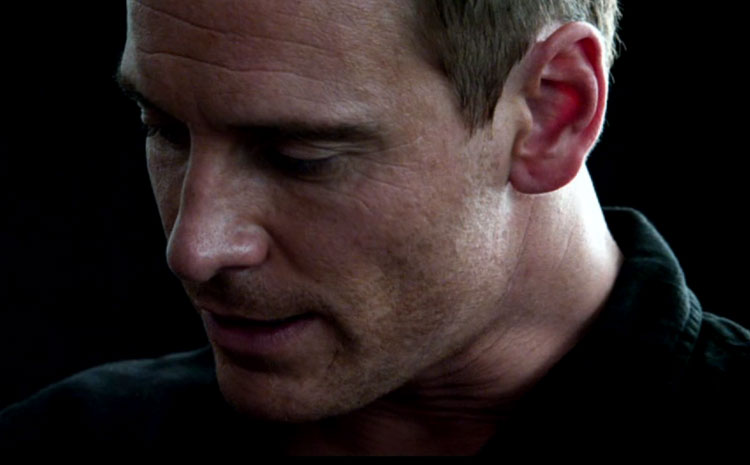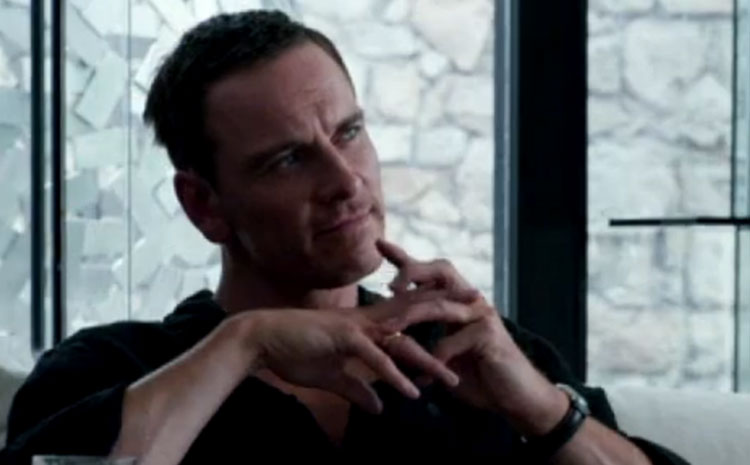
|

|

|

|

|

|

|

|

|

|

|

|


Q: So, you read Cormac McCarthy's The Counselor?
A: Twice. The first time because I'm a legitimate Southern-fried McCarthy scholar and the second time because I only vaguely understood it the first time. Have you ever tried to watch a movie and halfway through, think, "Man, I don't think I understand the plot but I’m pretty excited by all the violence"? I did that a couple weeks ago when I saw Steven Soderbergh's Haywire. Sometimes when I see art films, I think, “Man, this is pretty unconventional but I also feel sad and I kind of want to stick my head in an oven like Sylvia Plath." I did that a couple of weeks ago when I saw Derek Cianfrance's Blue Valentine. The Counselor kind of combines both of those ambivalent sensations and does so with Faulkner-in-Sanctuary-mode panache.
You ever receive a screenplay and open it up and think, "What the fuck is this? A play?" Because I did that, too. As someone who works as a screenwriter, as someone who took many years to adapt to the industry's formatting and conventions, my first instinct was to scream, "Fuck this guy! How dare he invent his own screenwriting format! Who the fuck does this guy think he is?!"
Oh, it's Cormac McCarthy. He won the Guggenheim Fellowship, also known as The Genius Award. In addition, not only has he won the National Book Award, the National Book Critics Circle Award, the PEN Award, but he also won Pulitzer Prize for fiction for The Road. With those kind of laurels, you can kind of do whatever you want.
Still, this raises the question, in the world of screenplays, do we still hold such an author to the same standards as everyone else? When it comes to story and character, yes. But, when it comes to formatting and breaking rules, you're just gonna have to leave your specialized mindset at the door. There's an excellent article on creativity in Psychology Today that says, "The more expert and specialized a person becomes, the more their mindset becomes narrowed and the more fixated they become on conforming what they believe to be absolute. Consequently, when confronted with new and different ideas, their focus will be on conformity. Does it conform with what I know is right? If not, experts will spend all their time showing and explaining why it can't be done and why it can't work."
I'm not here to do that. Look, even in the world of novels, McCarthy has always gone against the grain. The man doesn't like semicolons and uses commas sparingly, so the glue holding all the sentences together are contractions. He never uses quotation marks either. Why should we expect anything different in one of his scripts? He doesn't see the need for slugs. Diagramming some of his sentences in the AD lines is like a choose-your-own-adventure story. He still writes on an Olivetti typewriter. These pages were probably collected in a shoebox and then quickly retyped by an assistant into MS Word.
It's kind of like having a not-playfully racist grandfather who is set in his ways. Sure, you can try to tell him that the word "negress" is not considered proper lexicon in polite society, but what's the point? He's just gonna keep on truckin' till his number's up. (Double Cliche).
Q: So, what's the story about, Rog?
A: Think Body Heat or the Edgerton's The Square but set against the backdrop of the border world McCarthy explores so well in his Border Trilogy and novel, Blood Meridian. If these stories exist in a Venn diagram, they take place inside the circle where the not so insulated worlds of Mexico and the United States collide. This territory is a no man's land where characters from the so-called civilized world experience great violence and brutality, where destiny has its own gravitational pull and the best at surviving the territory are those who are so damaged they’ve transcended polite society's moral code. It is a place heroism is not rewarded. It's punished. If you don't believe me, look at the ending to No Country for Old Men. In the face of evil, only other predators have a chance at surviving.
So, it's no surprise that McCarthy chooses to tell a cautionary tale set against the drug war violence that is taking place in Mexico right now. In Mexico, murder has become a national pastime. It is a collective enterprise. And, it is spilling over into our border towns.
Q: Who are the characters?
A: This is the tale of the Counselor, a man, who when we first meet him, is in bed with the love of his life, Laura. We see him in Amsterdam, in a jeweler's shop, procuring the perfect diamond for his bride to be. We're treated to a philosophical and prophetic lesson from the Dealer. He tells the Counselor the Jewish civilization is the only true civilization, and that any country that has driven the Jews out has never been the same. He waxes a McCarthy monologue about the one true God, who is immovable, and tells us that stones are the true witnesses since they've been around since the beginning. When the Counselor picks out his diamond for Laura, the Dealer says, "This is a cautionary stone. You will see."

Intercut this with the intriguing couple of Reiner and Malkina, who are in the Southwest desert hunting with their pet cheetahs. Yes, this couple, who seem like some kind of S&M Hemingway power-duo, own cheetahs. More specifically, they are Malkina's cheetahs, and Malkina is the one we ought to be paying attention to. A native of Buenos Aires, we notice the Egyptian cat tattooed on her brown skin. She's sexy, possessing a Moriarty-like intelligence so cunning even her beau, Reiner, is terrified of her. Another important note about Malkina is that she knows her way around technology, around computers. She might also be quite mad. Perhaps we're supposed to think she makes Lisbeth Salander seem like a Disney princess in comparison.
The third strand in this tapestry is a septic tank truck that is making its way from Mexico to the United States, which we can assume is loaded up with about twenty million dollars worth of Colombia's finest. All these elements we are introduced to as the opening credits are playing.
Q: What's the caper, Rog?
A: Much like the protagonists in Body Heat and The Square, the Counselor is motivated by his love and lust for a woman. Because of her, he wants to get rich quick. He decides to go all in concerning a business venture with Reiner, who has learned never to speak in arraignable phrases. Reiner is filthy rich because his demeanor and surroundings and the gifts he provides for Malkina tell us so. And it's easy to see that Reiner's source of wealth comes from mines that aren't always legal.
The idea is to get into the drug business unnoticed while all the cartels are busy killing each other. That septic tank truck from earlier? It's carrying 625 kilos of cocaine from Mexico to Chicago and will sell for two grand an ounce on the street, meaning this is a twenty-million dollar payload for all involved. The Counselor asks, "If the drug wars stop this will dry up, right? "Yeah. Bad times are good times for guys like us."
But, what happens if the cartels find out about this new start-up company? The answer to that question, as we learn in the second half of the script, is very bad things. The characters tell us that three thousand people were killed in Juarez alone last year. We learn something about the nature of the men in these cartels. Before the drug wars, thousands of young and attractive factory workers were being kidnapped and sexually mutilated. The maquila girls, they were called.
The money trail led to the men in the cartels. "So much cash you're using it to insulate your own house and you're morally depraved out of all human recognition, what will you spend your money on?" The answer to that, is snuff films, and we learn that we’re probably not separated more than two degrees by someone who has seen a snuff film.
When it comes to men who have kidnappers on full retainer, even the smallest little detail becomes life or death for the Counselor and everyone he knows. There's a lot of talk about the dangers of dabbling into this trade, and in fact, most of the scenes in the script are characters warning the Counselor. One of the characters even quotes Blood Meridian at one point, "Yet even the smallest crumb can devour us."
Q: So, what's the crumb that devours everyone, Rog?
A: There's a drug runner, a character named Young Man, who is to rendevouz with the septic tank truck and presumably drive it to Chicago. Except, you know, he never makes it to the truck.
There's another problem. Not only does the Counselor have to worry about what may become of the drug runner, there are complications with the money people. He has to get money into Mexico and get it back out again. In order to do this, one has to filter the money through a corporation, which means there has to be a money person on the inside handling all of the bank transactions, “The biggest issue is that your guy is not going to fall in love with a pole dancer and go south with three million of your ducats. The biggest issue is that someone is going to find out who he is and what he’s up to.”
In one of the more creative ways of killing a drug runner I think I've ever heard about or seen, we learn that there are other parties looking to intercept this shipment of drugs and ruin everything for the Counselor. To complicate matters, the Counselor is linked to the drug runner in a way that is most unfortunate and may redefine dramatic irony.
It's interesting to note that the main story involves all of the men in the script, and it dovetails with character revelations concerning Malkina, as shown by her scenes with Laura (she has an ominous dream about Malkina; pay attention to the scene at the confessional) and the stories Reiner tells about her. Although Reiner, being a criminal, is concerned about the cartel men, he is genuinely frightened of his own girlfriend. His views on women could probably be called misogynistic, and it’s the type of misogyny only a man who has been twice divorced can really relish.
Of course, everything goes wrong for our guys and the most exciting part of the script is seeing how that all unfolds. I'm not exaggerating when shit hits the fan and a line forms to kill the Counselor. My favorite part was seeing how one specific character reacts to all this misfortune and how they enact revenge on some of the parties responsible.
